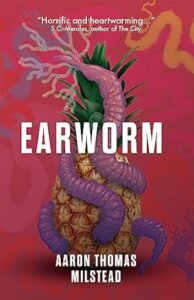Earworm by Aaron Thomas Milstead
Blood Bound Publishing, 2019
ISBN: 9788397672245
Available: Paperback, KIndle edition
Buy: Amazon.com
An earworm is loosely defined as “an annoying pop song you hate and loathe, but somehow the damn thing gets stuck in your head and keeps boinging around.” Example: Taylor Swift’s entire catalogue. (I make no apologies to Swift fans) In Earworm, it’s a bit more: it is an actual annoying voice that talks and responds to you (or is it?). Protagonist Ripley McCain had better listen, since he might need to help save the human race, as well as himself.
Earworm is a good horror/thriller read, with some surprising emotional depth: there are a few spots where readers might start sniffling and reach for a tissue. Ripley is an excellent lead character: it’s impossible not to like him, due to his struggles. He does everything he can to win back his wife, overcoming the bottle…and finds out he has six months to live. Fate intervenes in the form of the earworm. Important: it’s a symbiote, not a parasite. For readers that flunked Biology 101, that means each creature feeds off the other, to the mutual benefit of both. These aren’t Star Trek 2’s brainworms. However, Ripley’s earworm does have a task for him: protecting the worm from certain other worms that want to destroy it, and destroy all people as well.
The story is a nice split between Ripley’s actions to stop the evil earworms of the world, and the dialogue with his own worm. Their conversations are always entertaining. The worm is certainly not a formal voice of wisdom, it’s more like his new best friend, for a guy that desperately needs friends. The emotional part comes from Ripley’s scenes with his wife and daughter as they try to settle things, and some of the dialogue with the earworm. These parts are very well done, and raise the story above the standard horror novel. It helps to get readers invested in Ripley’s character, and they will cheer him on till the end.
That being said, there’s plenty of action along the way: walking corpses, tentacles blasting out of people, and possessed chickens. The supporting cast helps move the action along and provides a nice contrast, the doctor who knows the secret of the earworms stands out, and Ripley’s drunken sort-of friend who is along for the ride helps the story also.
The only drawback is that there are too many analogies to pop culture. They are useful tools in moderation, but detract from what is good writing, and they should have been whittled down to a manageable number.
The bottom line? Earworm is worth the read. It’s entertaining and unusual enough that most people will enjoy it. Bonus: you get an interesting discussion on how on Gilligan’s Island, the characters can’t escape because they are actually in hell. Recommended.
Reviewed by Murray Samuelson






Follow Us!